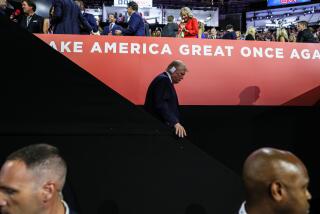Terrorism Lures Americans to Near-Panic and Nonsense
- Share via
FRANKFURT, West Germany — Here in the air-travel hub of Europe it is hard to fathom America’s near-panic over terrorism. Only 23 Americans were killed by terrorists overseas last year; 9,819 were shot to death back home the year before. Yet the same Congress that has just weakened controls on handguns is now so focused on terrorism that it is considering a bill that would eviscerate the War Powers Act, sanction assassination and trammel the legislative branch’s power to limit presidential use of military force.
If this seems illogical and excessive, it may be because terrorism seems illogical and its methods excessive. Yet there is logic in the terrorists’ choice of weapon. Lacking traditional power, they are conducting psychological warfare. They have tapped the primal fear of being jumped in the dark, and for no apparent reason other than, in this case, being an American.
And so the issue now has become the U.S. government’s responsibility to guarantee life, liberty and the pursuit of happiness wherever an American citizen goes. Washington has taken up this mandate, never mind the political and economic costs to its friends. All of the weights and counterweights of alliances, the global economy, the balance of peace are now reduced to the silliness of television tips steering Americans to “safe” destinations for a summer vacation.
However insignificant in terms of real odds, terrorism does more than make us afraid to travel. It ends our illusions of safety as surely as World War I ended Britain’s sense that the established world would go on forever.
Terrorism has a grip on the nation’s imagination because it disturbs our sense of America’s place in the order of things. With World War II we supposedly accepted that two broad oceans can no longer keep foreign conflicts at bay. Not true. Despite our engagement with the outside world, nuclear weapons remain an abstraction, and forces and bases abroad mean that threats are still “over there.”
For terrorism to have such an effect in our culture, it needs our media. The picture of tourists’ bodies strewn around the Rome airport lounge has become a standard adjunct to media reports, feeding the distortion and exaggerated fear of terrorism.
Our leaders have played into the terrorists’ hands, too. Jimmy Carter ensured that the Iranian hostage crisis would become “America held hostage” by restricting most of his presidential campaign to the White House Rose Garden.
During the odyssey of hijacked TWA Flight 847 last year, Ronald Reagan wisely tried to go about his business, but he was thwarted by television’s compelling grasp on national attention. Now unable to “beat ‘em,” he has “joined ‘em” and taken the lead in hyping both the threat and military remedies that he must know cannot work.
The President is unmatched in reading the public mood, and his rhetoric demonstrates that the U.S. view of and response to terrorism is far more about domestic attitudes than foreign policy. Thus we should not be surprised that the European allies cannot understand what the fuss is about, while we cannot accept European advice to measure the practical effect on terrorism of our government’s lashing out.
Terrorism has pierced the veil that we drape between ourselves and knowledge of Third World turmoil. To begin doing something about terrorism requires moving beyond self-preoccupation to clear analysis of what we face as a nation. This must include seeing that we cannot make the outside world go away, as so much of Reagan’s foreign policy has tried to do. It must include seeing America’s inescapable duty to lead in Middle East peacemaking--a truism obvious to everyone beyond the White House fence. It must include knowledge that power can back politics in countering terrorism, but can’t replace it.
Most important, the President must level with the American people. However unfair, the United States is a target of terrorism--less, though, than some other countries--and will continue to be. It is not to “blame America first” to see that our power, posture and position in many parts of the Third World make us a target for the “poor man’s atom bomb.”
We may or may not choose to deal with how we are viewed and why we are attacked. But we cannot avoid the knowledge that terrorists will win if, through inflated rhetoric, we multiply their role a thousandfold. To be serious about putting terrorism in its place, the President must begin by putting it in perspective.
More to Read
Sign up for Essential California
The most important California stories and recommendations in your inbox every morning.
You may occasionally receive promotional content from the Los Angeles Times.










